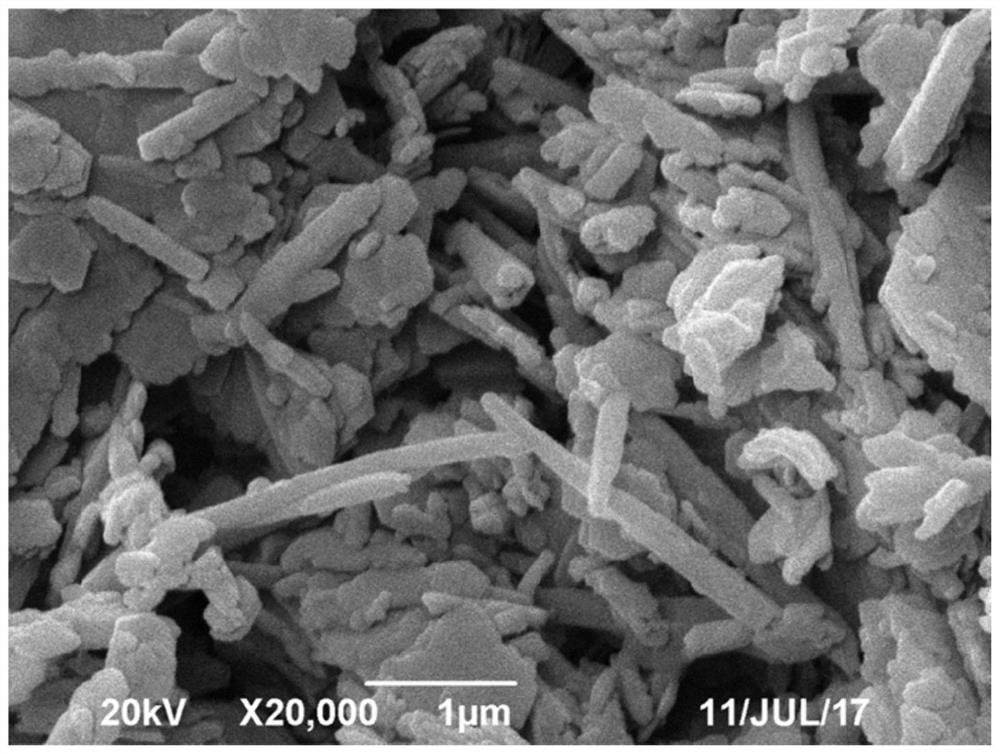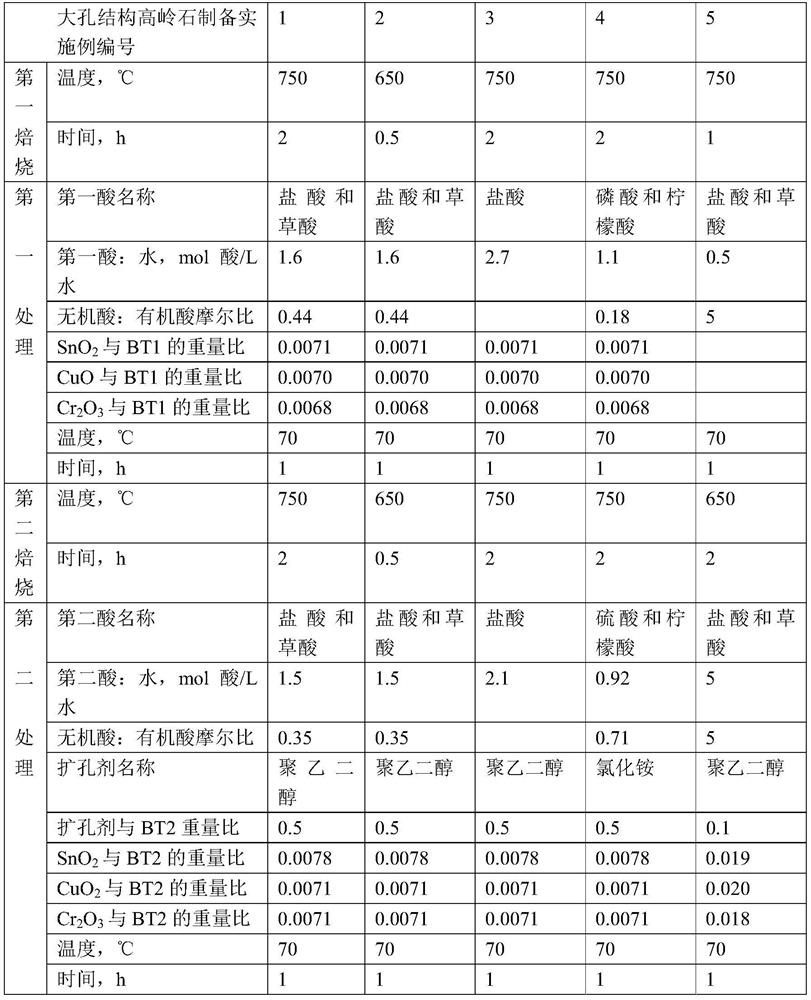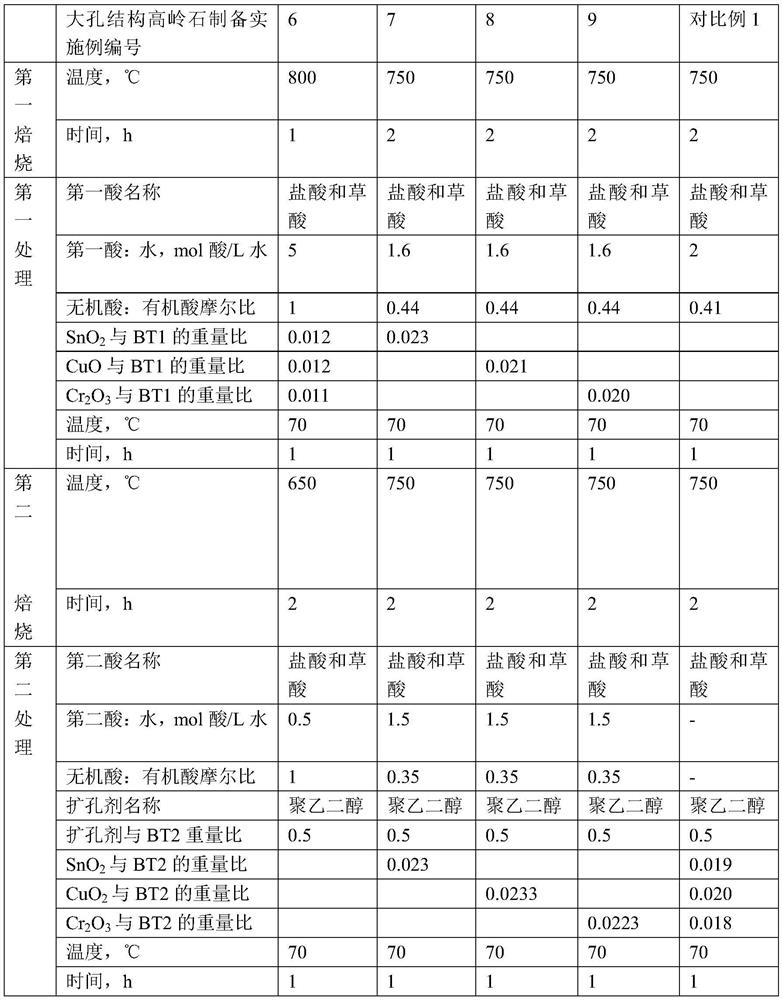A kind of macroporous kaolinite and its preparation and application
A technology for kaolinite and kaolinite, applied in the field of kaolinite and its preparation, can solve the problems of difficult filtration, small particle size of kaolinite, and high industrial production cost, and achieves good coke selectivity, high gasoline octane number, and heavy oil cracking. good effect
- Summary
- Abstract
- Description
- Claims
- Application Information
AI Technical Summary
Problems solved by technology
Method used
Image
Examples
preparation Embodiment 1
[0076] Kaolin A was roasted at 750° C. for 2 hours to obtain a roasted material (called the first roasted material), and 168 g (dry basis, the same below) of the roasted material was added to decationized water (pH=3.1, the same below) and stirred to prepare To form a slurry with a solid content of 25% by weight, add 500 g of hydrochloric acid and 100 g of oxalic acid, 1.5 g of stannous chloride, 2 g of cupric chloride, and 4 g of chromium chloride hexahydrate at a concentration of 1 mol / L, heat up to 70° C., and stir at 70° C. After 1 hour, remove the mother liquor by filtration, and dry the filter cake to obtain the product of the first step; 120 g of the product of the first step was roasted at 750° C. for 2 hours to obtain a roasted material (called the second roasted material), 100 g (dry basis, below Same) Add decationized water to the second roasting material and stir to obtain a slurry with a solid content of 25% by weight, add 200 g of hydrochloric acid, 50 g of oxalic...
preparation Embodiment 2
[0078]Kaolin A was roasted at 650° C. for 0.5 hour to obtain a roasted material (referred to as the first roasted material). 168 g of the first roasted material was added to decationized water and stirred to obtain a slurry with a solid content of 25% by weight. 500g of hydrochloric acid, 100g of oxalic acid, 1.5g of tin protochloride, 2g of cupric chloride, and 4g of chromium chloride hexahydrate, heated up to 70°C, stirred at 70°C for 1 hour, then filtered to remove the mother liquor, and the filter cake was dried to obtain the first The first step product; 120g of the first step product was roasted at 650°C for 0.5 hour to obtain a roasted material (called the second roasted material), and 100g of the second roasted material was added with acidic water (decationized water) and stirred to obtain a solid content of 25% by weight Add 200g of hydrochloric acid and 50g of oxalic acid, 50g of polyethylene glycol, 1g of tin protochloride, 1.2g of cupric chloride, 2.5g of chromium c...
preparation Embodiment 3
[0080] Roasting clay A at 750° C. for 2 hours to obtain a roasted material (called the first roasted material), 168 g of the first roasted material was added with deionized water and stirred to obtain a slurry with a solid content of 25% by weight. 500g of hydrochloric acid, 1g of stannous chloride, 1.5g of copper chloride, 4g of chromium chloride hexahydrate, heated up to 70°C, stirred at 70°C for 1 hour, then filtered to remove the mother liquor, and the filter cake was dried to obtain the product of the first step; 120 g of the product of the first step was roasted at 750° C. for 2 hours to obtain a roasted material (called the second roasted material), and 100 g of the second roasted material was added with deionized water and stirred to obtain a slurry with a solid content of 25% by weight. Add a concentration of 5 mol / 200g of L hydrochloric acid, 50g of polyethylene glycol, 1g of stannous chloride, 1.2g of cupric chloride, 2.5g of chromium chloride hexahydrate, heated to...
PUM
| Property | Measurement | Unit |
|---|---|---|
| diameter | aaaaa | aaaaa |
| diameter | aaaaa | aaaaa |
| specific surface area | aaaaa | aaaaa |
Abstract
Description
Claims
Application Information
 Login to View More
Login to View More - R&D
- Intellectual Property
- Life Sciences
- Materials
- Tech Scout
- Unparalleled Data Quality
- Higher Quality Content
- 60% Fewer Hallucinations
Browse by: Latest US Patents, China's latest patents, Technical Efficacy Thesaurus, Application Domain, Technology Topic, Popular Technical Reports.
© 2025 PatSnap. All rights reserved.Legal|Privacy policy|Modern Slavery Act Transparency Statement|Sitemap|About US| Contact US: help@patsnap.com



